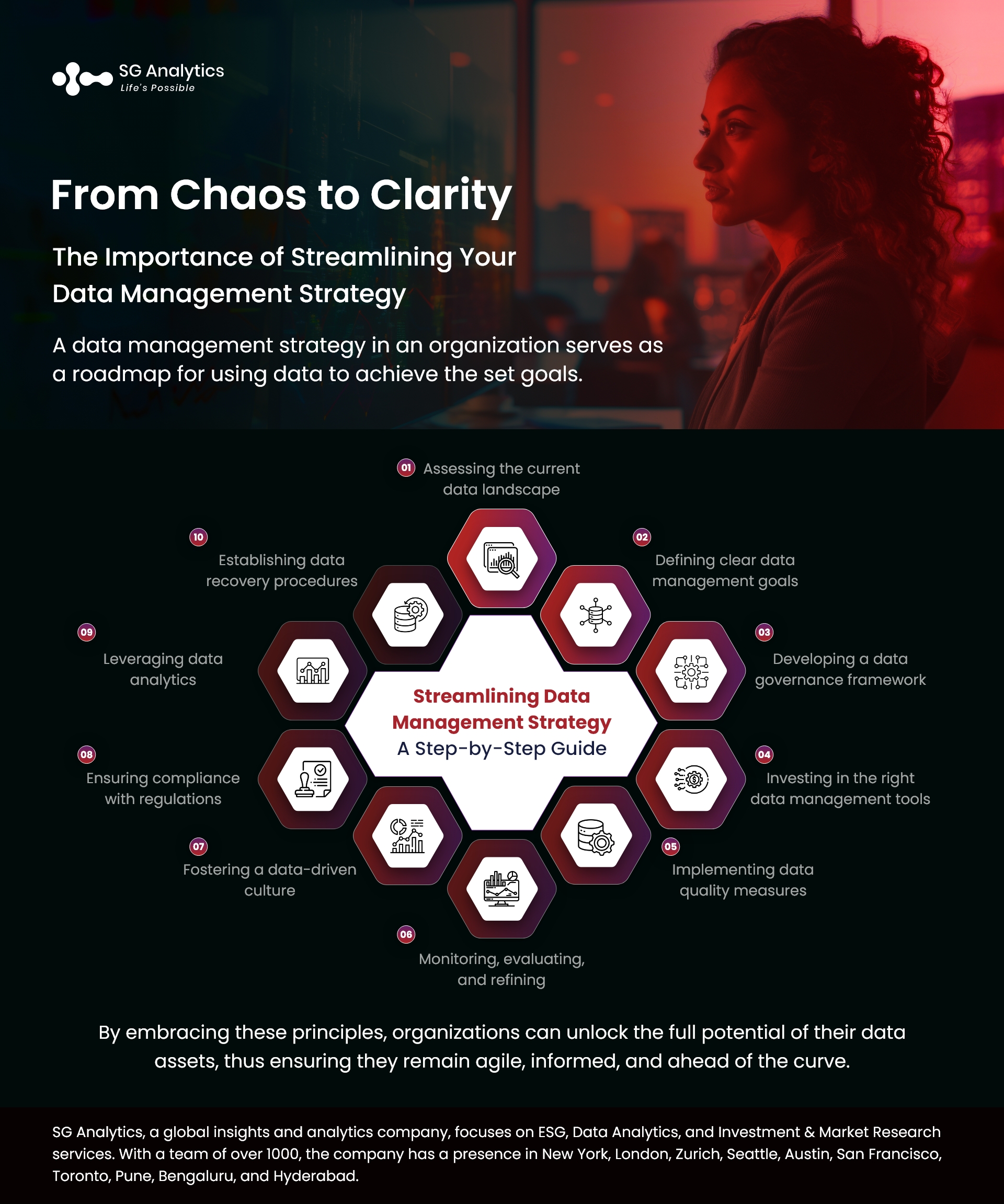With the digital landscape growing, the significance of implementing robust data management cannot be overstated. A well-structured data management strategy is critical for businesses to harness the full potential of their data, leading to enhanced decision-making, improved efficiency, and a competitive edge. For businesses to establish a solid data management foundation, it is important to effectively collect, organize, and utilize data to drive success.
The Explosion of Data
Data has become critical to corporate operations across industries in the current digital era. Data fosters innovation and decision-making by providing insights about customers, markets, and finances. However, without efficient data management systems in place, the sheer complexity of data can result in a stir.
Businesses are faced with both – possibilities and difficulties due to the data explosion. Organizations have copious amounts of information that may propel corporate expansion and enhance consumer satisfaction. However, efficiently handling this data has grown more difficult, giving rise to problems like:
Read more: Harnessing the Power of Data for Data-driven Decision-Making and Business Growth
- Data Silos: Information that is difficult to use or access within an organization. This can be caused by disparate data sources.
- Data Security Risks: Due to increased cyberattacks, businesses are placing a high premium on maintaining data security and compliance with laws.
- Problems with Data Quality: Inaccurate data can doubt the validity of analytics and insights drawn from the data, leading to poor judgments.
- Scalability Issues: Organizations must ensure that their data management infrastructure can grow effectively and accommodate growing storage and processing needs.

The Need for Data Management Strategy
A data management strategy in an organization serves as a roadmap for using data to achieve the set goals. This roadmap helps ensure that all the activities surrounding data management, ranging from collection to collaboration, work efficiently and can be useful and easy to govern. With the right data management strategy in place, the organization can avoid some of the common data challenges, including:
- Duplicate, incompatible, or missing data from inconsistently documented data sources.
- Siloed projects that use the same data but often duplicate the efforts, thus increasing the costs of data.
- Data activities that are time-consuming but do not contribute to business goals.
A data management strategy acts as a foundation for consistent data approaches, successful integration, and business growth.
Read more: Where Data Meets Dominance: Unleashing the Power of Data
Streamlining Data Management Strategy: A Step-by-Step Guide
Addressing the ongoing data issues and realizing the full potential of data assets require effective data management. The following are some ways that data management strategies can help businesses to succeed:
-
Assessing the Current Data Landscape
By assessing the existing organizational data infrastructure, organizations can identify the types of data they collect, where it is stored, and how it is currently being used. Understanding the status quo is critical for recognizing the strengths and weaknesses of the current data system, which will further inform the development of a more robust data management plan.
-
Defining Clear Data Management Goals
Setting measurable, achievable, and time-bound goals for the organizational business strategy will help improve data quality, streamline data access, and ensure compliance with regulations. This will further help organizations in setting clear objectives, thus guiding their efforts to measure progress.
-
Developing a Data Governance Framework
Establishing a set of policies and procedures can enable organizations to dictate how data is handled within their organization. This framework involves roles and responsibilities, data standards, and protocols for data usage and privacy. A strong governance framework acts as a backbone of robust data management.
-
Investing in the Right Data Management Tools
Choosing the right data management tools is essential for aligning organizational objectives and integrating them with existing systems. These tools streamline the collection, storage, processing, and analysis of data while maintaining data quality and consistency. In addition, secure cloud storage solutions offer scalable, reliable, and protected environments for storing sensitive data, ensuring easy access and seamless collaboration across teams, while safeguarding against potential data breaches. Investing in these tools ensures better decision-making, operational efficiency, and long-term growth for businesses.

-
Implementing Data Quality Measures
Data quality is paramount. Implementing data processes to regularly clean, validate, and standardize data further ensures that the data the organization relies on can be used for accurate decision-making.
Read more: Data Quality Management: Key Challenges and Solutions for Data Consultants
-
Monitoring, Evaluating, and Refining
Data management is an ongoing process. Monitoring the data systems, evaluating performance against the set organizational goals, and adjusting them as per the needed approach helps in maintaining a robust data management strategy. This further helps in evolving with the business needs.
-
Fostering a Data-Driven Culture
Encouraging a culture within the organization where data is valued is a critical asset. Promoting data literacy across all departments and emphasizing the importance of data-driven decision-making will enable the team to appreciate the significance of data. This will enable them to adhere to management protocols and leverage data effectively.
-
Ensuring Compliance with Regulations
Staying up to date with the latest data protection laws helps ensure the data management practices not only help protect the organization from legal repercussions but also builds trust with their customers by safeguarding their data.
-
Leveraging Data Analytics
Utilizing data analytics helps in extracting valuable insights from organizational data, helps identify trends, forecast future outcomes, and inform strategic business decisions. Investing in data analytics can help transform data into a powerful tool for innovation.
-
Establishing Data Recovery Procedures
Implementing robust backup and recovery procedures helps protect the organizational data against loss or corruption. Regularly testing these frameworks ensure they are effective, so that the data can be restored quickly in the event of an incident.
Read more: From Mess to Magic: Streamlining Data Operations for Maximum Efficiency
Key Takeaways
- Assessing and understanding current data infrastructure to identify areas for growth.
- Setting SMART goals for data management initiatives to track progress.
- Developing and implementing robust data governance strategy to maintain data integrity and compliance.
- Investing in the right tools that support the organizational data management objectives.
- Implementing ongoing data quality measures to ensure the reliability of the data.
- Training the team to foster a data-driven culture within the organization.
- Regularly monitor, evaluate, and refine the data management processes to stay updated.

Elevate Your Data Management Strategy
A data management strategy plays a critical role in the modern business landscape. Effective data management is about handling vast amounts of information as well as transforming data into insights for strategic decision-making and fostering a culture of continuous improvement. By embracing these principles, organizations can unlock the full potential of their data assets and ensure they remain well-informed and ahead of the curve.
A leading enterprise in Data Solutions, SG Analytics focuses on integrating a data-driven decision framework and offers in-depth domain knowledge of the underlying data with expertise in technology, data analytics, and automation. Contact us today to make critical data-driven decisions, prompting accelerated business expansion and breakthrough performance.
About SG Analytics
SG Analytics (SGA) is an industry-leading global data solutions company providing data-centric research, contextual, and marketing analytics services to its clients, including Fortune 500 companies, across BFSI, Technology, Media & Entertainment, and Healthcare sectors. Established in 2007, SG Analytics is a Great Place to Work® (GPTW) certified company with a team of over 1200 employees and a presence across the U.S.A., the UK, Switzerland, Poland, and India.
Apart from being recognized by reputed firms such as Gartner, Everest Group, and ISG, SGA has been featured in the elite Deloitte Technology Fast 50 India 2023 and APAC 2024 High Growth Companies by the Financial Times & Statista.

